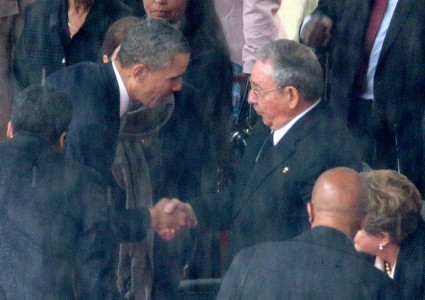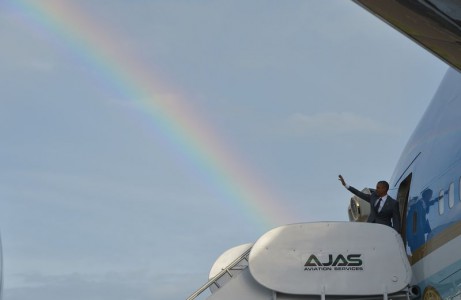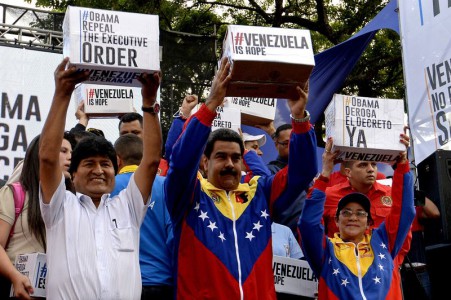By Amanda Taub

President Obama is escaping DC’s soggy spring weather this week with a three-day trip to the Caribbean and Central America, starting with Jamaica on Thursday. But there’s much more going than just a sunny tropical vacation.
After his meetings in Jamaica, Obama will attend the Summit of the Americas in Panama City, where he’s expected to have “an interaction” with Cuban leader Raoul Castro, the first since the US and Cuba began to normalize relations last December. He can also anticipate a tense encounter with Venezuelan President Nicholas Maduro, who has announced plans to present Obama with a petition signed by 10 million of his citizens protesting sanctions the US recently imposed on Venezuelan officials.
Behind those meetings lies something more significant. Venezuela used to sell cheap oil to strengthen its ties with other countries in the Americas, but now that falling oil prices have left Venezuela’s economy in tatters, its Caribbean partners — including Cuba — have begun to look to the US for support. What we’re seeing in this summit is, potentially, the beginning of a real shift in the political relations of the Western Hemisphere.
Falling oil prices and Cuba’s reconciliation with the US

This won’t be the first time that Obama and Castro will have met: they shook hands at Nelson Mandela’s memorial service in 2013. Obama still isn’t scheduled to have an official meeting with Castro during the summit, but the two leaders expect to have “an interaction,” State Department official Roberta Jackson, who has been leading the administration’s efforts to normalize relations with Cuba, said at a recent Brookings Institution event.
In the context of US-Cuba relations, that’s a fairly big deal. It will represent progress in the normalization of relations that the US and Cuba began in December, when the two countries announced a historic agreement that would allow for increased US travel and trade with Cuba, in exchange for Cuba releasing certain political prisoners and permitting broader freedoms on things like internet access.
Many analysts believe Venezuela’s economic problems may have been at least one impetus for Cuba to seek a thaw in its relationship with the US. Venezuela had long been Cuba’s strongest ally, providing the country with billions of dollars of aid in the form of subsidized oil.
As Venezuelan political scientist Francisco Toro noted in a recent article for FiveThirtyEight, when the price of oil dropped last year, the value of that aid plummeted along with it. The US-Cuba deal was announced just weeks after OPEC’s November 2014 decision to let oil prices fall by keeping production high. Toro suggests that Cuba may be seeking dollars from American tourists and remittances to make up the shortfalls in its aid from Venezuela.
The fall in oil prices also battered Venezuela’s oil-dependent economy, raising questions about whether it would be able to continue its support at all.
“Given the economic disaster in Venezuela today any rational person dependent on Venezuelan financial support would have to be looking at other options,” Cynthia Arnson, the director of the Latin American program at the Woodrow Wilson International Center, told the Miami Herald last December.
Obama’s stopover in Jamaica could be more oil diplomacy

Obama’s stop in Jamaica on the way to the summit may have been an attempt to capitalize on Venezuela’s waning influence in other parts of the Caribbean, as well.
NPR reports that energy is an “Achilles heel” for islands like Jamaica and the Dominican Republic, which rely on imported oil for electricity generation. They, too, have gotten a lot of help from Venezuela in recent years through its Petrocaribe program, but now Venezuela’s economic problems make that assistance look increasingly insecure.
If the islands lose access to affordable oil, that could lead to economic hardship. Jorge Piñon, the director of the Latin America and Caribbean Energy Program at the University of Texas, told NPR that could lead in turn to social upheaval. “With economic hardship comes social disruptions that the United States certainly doesn’t want in the Caribbean.”
The US is well-placed to fill those energy needs, which may also give the US an opportunity to expand its influence as Venezuela’s wanes.
“We, in looking at the region, saw that a number of the [Caribbean] countries had significant energy needs,” White House Deputy National Security Adviser Ben Rhodes told USA Today. “At the same time, the United States has significant resources, not just in terms of our own energy production, but also in our energy infrastructure, in our ability to work with countries that have formed cooperative solutions to promote energy security.”
The Obama administration has been conducting lots of energy diplomacy in the region. Last June it announced the Caribbean Energy Security Initiative, which was intended to help Caribbean nations reduce their reliance on imported energy generally, and, by implication, on Venezuela’s Petrocaribe in particular. In January, Vice President Biden hosted Caribbean leaders in Washington at the Caribbean Energy Security Summit.
This is all bad news for Venezuela

Venezuela’s government is working hard to paint its economic woes as the result of nefarious meddling by the US.
As Moises Naim wrote in the Atlantic, Maduro has little other choice, politically. “It is essential for his political survival to convince the world — and especially his own citizens — that Washington is behind his country’s catastrophic situation,” he wrote. “Otherwise, it’s hard to explain the world’s highest inflation rate, a severe shortage of basic necessities, an economy spiraling out of control, and one of the world’s highest murder rates — all in a nation with [some of] the planet’s largest oil reserves.”
The Obama administration may have given Maduro an opening via the wording of a recent executive order that imposed sanctions on certain Venezuelan officials. The order identified Venezuela as a threat to national security, but the Obama administration apparently doesn’t actually believe that to be the case. According to the Wall Street Journal, Rhodes told reporters that “the U.S. doesn’t believe Venezuela poses some threat to our national security.” Rather, “we just have a framework for how we word executive orders.”
That hasn’t stopped Maduro from exploiting the order politically. According to Naim, radio and TV campaigns have warned Venezuelans that “the US has declared Venezuela a threat to its interests and is preparing to intervene — and even use military force.”
“Maduro is taking advantage of Obama’s order,” Luis Vicente Leon, head of Caracas polling organization Datanalisis told The Wall Street Journal.
That includes the petition Maduro reportedly plans to present to Obama. However, its 10 million alleged signatures may not all have been willingly given. Venezuelans have been under heavy pressure to sign the petition. According to the Wall Street Journal, state-run supermarkets have been collecting signatures from shoppers waiting in line to buy subsidized milk — an increasingly important commodity at a time when Venezuela is facing widespread shortages of basic goods — and state employees have been threatened that they will be fired if they refuse to sign.
WATCH: ‘Why the Cuba embargo needs to end’

